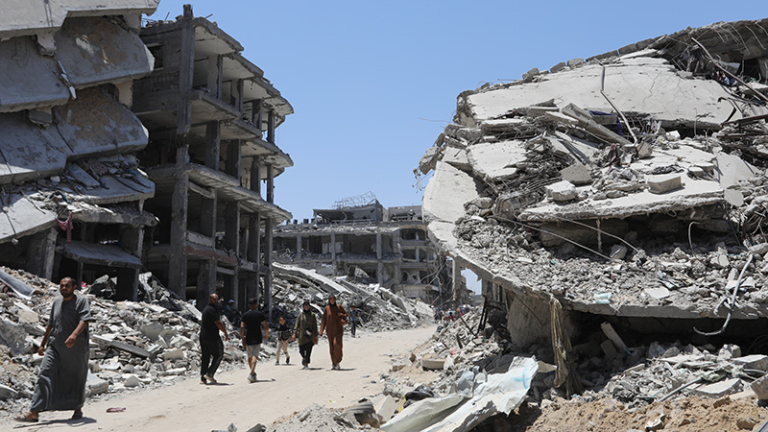
Some 300 days into the Israeli war on Gaza, and following Israel’s shocking July 31 assassination of Hamas’s Ismail Haniyeh, a major figure in ceasefire negotiations, the question of what will happen to Gaza—as both a political entity and a society—remains unanswered. Israel’s current government has not indicated a deviation from its objective of annihilating Hamas and imposing costs on Palestinians in Gaza, even if it means destroying the Gaza Strip entirely. Furthermore, American input has not facilitated solutions—to the contrary, the Biden administration has been heavily criticized for enabling the mass destruction over the past ten months. Although the American administration has expressed a preference for the Palestinian National Authority (PA) to govern a post-war Gaza, Israel has rejected the possibility. Finally, while Arab countries have made statements and expressed interest in one arrangement or another, it has become clear that no political resolution can move forward with the current level of American obstruction on the one hand and under continued Israeli bombardment on the other.
Perhaps most important, none of the actors mentioned above has done much, if anything, to take into account Palestinian aspirations or input on arrangements for Gaza, should we come to a ‘day after.’ Early on in the war, officials from the PA expressed that they cannot come to Gaza “on an Israeli tank.” In March, the cabinet of President Mahmoud Abbas resigned and a “technocratic” cabinet took its place, in an attempt to prepare for the end of the war. Former PA officials also floated ideas about how to incorporate Hamas into governing structures, working under the assumption that governance in Gaza would be viewed as illegitimate without the inclusion of this major Palestinian political party. The has been the topic under discussion even as both main political groups, Hamas, and Fatah (the party of the PA), perform poorly in public opinion polls. Recently, the PA proposed a day after plan to the US administration that would include Hamas in governing both the West Bank and the Gaza Strip. No answer can yet be discerned from Washington.
This brief addresses the view of the PA from a Palestinian perspective, outlining the ways in which it has found itself in a legitimacy crisis, and the policy preferences for which segments of Palestinian civil society have advocated. For many Palestinians, especially for members of politically-engaged civil society, the prospect of continued PA engagement without structural changes risks further stagnation. As such, civil society has advocated for unity efforts among political groups and across the diaspora.
The PA’s Legitimacy Crisis
Since its inception, the Palestinian Authority has been intended to function as a subordinate agent of the Palestine Liberation Organization. It was created as a result of the Oslo Accords, the series of agreements concluded between Israel and the PLO between 1993 and 1995, to function as an interim body and to begin building the Palestinian state that the Accords promised would emerge. The PA was given some degree of autonomy over parts of the occupied territories, with the idea that control would be expanded over time as the peace process progressed. The PA and its constituent institutions were staffed largely by Fatah party members and were led first by President Yasir Arafat, the head of Fatah, and after Arafat’s death, by Mahmoud Abbas.
With the peace process faltering and with the eruption of the second intifada in 2000, the state-building project failed to come to fruition. Concurrently, the PLO ceased to function and became an auxiliary organization with little power or utility. Parliamentary elections in 2006 brought further division to Palestinian politics, as Hamas won a plurality of the vote but was not allowed to govern. Clashes between Fatah and Hamas erupted in 2007 over control of Gaza, resulting in the latter’s decisive victory, allowing it to govern the Strip while the PA continued to rule in the West Bank. Governance in the West Bank and Gaza has been split ever since, contributing to the generally dwindling public approval of the PA and its role in Palestinian politics. As the governing entity, the PA is seen as the institution that presided over such divisions in the Palestinian body politic.
From the perspective of the Palestinian public, the PA has largely focused on controlling Palestinian society.
Public opinion reflects this. In polling right before the October 7 attacks, the Palestinian Center for Policy and Survey Research found that 62 percent of respondents believed the PA to be a “burden on the Palestinian people.” This rose to 68 percent a few weeks after of the start of the war. In the latest polling from May 2024, researchers found that 62 percent of Palestinians support the dissolution of the PA entirely.
These polls are not an aberration reflective only of the past 10 months of tragedy, but rather are a longstanding trend in Palestinian public opinion. Palestinians have watched the Oslo Accords and the peace process fall by the wayside. Instead of exercising political agency to improve Palestinians’ lives, PA leaders have continued to engage with the moribund process and to entrench themselves in power, undemocratically. This entrenchment is largely backed by the United States and by Israel itself. The PA has repeatedly postponed elections, living conditions in the occupied territories have deteriorated, and Israel has enjoyed greater impunity for its crimes. For decades, Palestinians have witnessed a worsening Israeli and Egyptian blockade of the Gaza Strip, which began in 2007, and increasing Israeli land grabs in the occupied West Bank, with no meaningful response from their own leadership. Palestinians thus have long felt that there is no way to hold their leaders accountable.
From the perspective of the Palestinian public, the PA has largely focused on controlling Palestinian society more effectively, hounding its political adversaries, and demonstrating to the United States and Israel its function as a security coordinator, rather than serving as an advocate for the Palestinian people. In this scenario, it is no wonder that scholars and civil society activists have described the PA as a “subcontractor to the occupation,” with PA officials responding aggressively to criticism or protest. The PA’s inability to defend Palestinians and keep them safe from settler and Israeli military violence compounds this deep sense of stagnation and illegitimacy.
The PLO
The structural issue underlying much of the PA’s condition is the fact that, because of the Oslo Accords, it has supplanted the PLO as the main face of Palestinian politics. This has essentially reduced the grievances and political objectives of the Palestinian people—as represented by the PLO—to the question of Palestinian governance in the occupied territories alone. Palestinians in refugee camps around the region, and Palestinians in the diaspora more generally, have been effectively removed from the discussion.
Furthermore, when the PLO was functioning, it encompassed many different political parties and trends. Thus, it appeared legitimate and representative of the Palestinian public, albeit imperfectly as a national liberation movement and not as a governing body of any particular territory. Nevertheless, this explains another contributor to Palestinian frustration with the PA as an institution: not only does its existence reduce the scope of the Palestinian question, but the PA’s domination by a single party, Fatah, does not reflect actual developments in Palestinian politics. Stagnation permeates the Fatah political party internally as well, as younger members and critics of Mahmoud Abbas are blocked from meaningful engagement in party politics.
Unity Efforts
Since the split in governance in 2007—Fatah in the West Bank and Hamas in the Gaza Strip, there have been numerous attempts to create a national unity government. Regional actors such as Egypt and Saudi Arabia have hosted countless meetings in pursuit of this objective. But these attempts have failed repeatedly, and the split in governance has persisted.
Among the Palestinian public, both Hamas and Fatah have suffered from low levels of support and approval. Within Gaza, protests emerged against Hamas governance in July 2023, and polling before October 7 showed deep-seated frustration—matching the sentiment in the West Bank toward the PA. Thus, while a unity government and an end to the blockade in Gaza were broadly supported demands, there was also the sense that Hamas and Fatah alone, operating within the state-building paradigm, would not be able to resolve the underlying issues imposed by the framework of the Oslo Accords. In the aftermath of October 7, the utility of a unity government—whether headed by Mahmoud Abbas or not—has also lost appeal.
Among the Palestinian public, both Hamas and Fatah have suffered from low levels of support and approval.
Given the devastation in Gaza, activists and civil society actors have embarked on a new effort to reinvigorate the Palestinian cause, calling the attempt “the National Conference for Palestine.” Organizers have been engaging with notable Palestinian figures across the diaspora and within the occupied territories, calling on the leadership to revive the PLO on democratic foundations. The meetings have encompassed Palestinians across the Arab world, Europe, and North America, but have thus far neglected Palestinians in Latin America, particularly in Chile, where the community is well established and resourced. Nevertheless, the project is an important initiative that attempts to respond to the current critical circumstances in a positive direction.
Finally, a meeting of Palestinian fourteen political factions in Beijing in July, including both main parties, Hamas and Fatah, led to a joint statement in which all parties expressed their support for reviving the PLO. As organizers of the National Conference for Palestine have pointed out, however, the statement did not come with any set timeline, so the impact of this effort remains to be seen.
Comprehensive Restructuring Is Required
Discussions of the ‘day after,’ and what comes next for Gaza’s people and politics, which ignore Palestinian demands and aspirations will only perpetuate the stagnation and illegitimacy that led to the current situation. The issues with the PA’s illegitimacy and lack of support are structural: they cannot be resolved by changing faces in the cabinet or signing joint statements at the level of political party leadership.
The Palestinian public has long demanded a comprehensive restructuring of Palestinian political life and institutions, and a revival of the PLO in some form, to address the underlying issues imposed by the Oslo Accords. This “peace process” has not only been unable to bring peace but has also exacerbated conditions and increased the likelihood of continued mass violence.
It has been too easy to ignore Palestinian aspirations and the United States and its allies continue to operate under the assumption that they can be ignored. But if October 7 and the Israeli relentless assault on Gaza, which has credibly been identified as genocide, have shown anything, it is that such business as usual is simply unsustainable. Now more than ever, Palestinian initiatives must seriously include the input of civil society actors (such as the National Conference and others) and incorporate their efforts and ideas into policymaking moving forward.
The views expressed in this publication are the author’s own and do not necessarily reflect the position of Arab Center Washington DC, its staff, or its Board of Directors.
Featured image: Shutterstock/Anas Mohammed

